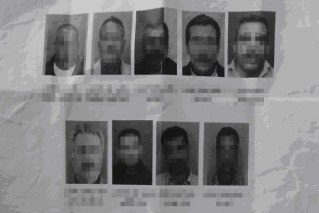At the end of December 2013, posters were hung in the Al-Arrub Refugee Camp in the occupied West Bank with pictures of 9 parents who have a child who is currently in a military prison facility or who has been arrested in the past. The names of the parents were written below their photograph alongside a threatening message asserting that if they do not prevent their children from participating in “acts of terror,” then “the IDF will be forced to intervene to stop the recurrence of these activities.”
The warning included the sentence: “Stop them before it’s too late. Consider yourselves warned” and is signed by “Abu Salam” of “IDF Forces Headquarters.” In early January 2014, additional threatening posters were distributed at the Al-Arrub Refugee Camp, but without pictures of the camp residents. This is not the first time that the army has used posters with pictures of civilians to deter youth from throwing stones or participating in protest activities in the Occupied Territories. In June 2013, posters containing the pictures of four minors were hung in the town of Kafr Qadum with a similar threatening message.
On a number of occasions the Association for Civil Rights in Israel (ACRI) and B’Tselem contacted the Legal Adviser of the IDF’s Judea and Samaria Division to demand the immediate cessation of the illegal distribution of these posters as a method of dealing with riots and stone-throwing. ACRI Attorney Raghad Jaraisy and Noam Raz from B’tselem emphasized in these demands that there is no justification for such tactics of inciting fear and intimidation. If the IDF possesses any information pertaining to illegal activity performed by the parents in the photos or their children, then it must initiate legal proceedings as opposed to resorting to intimidation. In the absence of such legal proceedings, the publication of photographs of the residents is a serious violation of privacy and dignity, and extends even to the level of persecution due to the implied threat that they are being targeted. Moreover, the publication causes terror among the rest of the camps’ residents who feel that the army is attempting to sow fear among them and prevent them from participating in public protests.
Related:
http://www.acri.org.il/en/2014/01/28/wantedposters/



